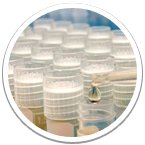Ethical viewpoints in biobanking
Biobanks primarily support research activities from which there are usually no expected individual-level benefits for sample donors. Health-related issues should always be primarily addressed to the health service.
The risk of misuse of samples and data in a biobank is very low. Samples and related data may be released for domestic and international research projects, including to countries outside the EU and EEA (e.g. the US), where the level of data security varies. Data protection is ensured by coding the samples and data, and by concluding precise agreements on the conditions of release and the processing of samples and data. While it is difficult to guarantee full data protection, for example when studying genetic data, in practice genetic data can only be linked to a sample donor if the genetic data from the donor is obtained elsewhere. It is almost impossible to identify an individual person from the coded data. Disclosure always takes place within the framework of the law and the consent of the sample donor.
THL Biobank does not sell samples and data to any third party. However, it may charge users a fee corresponding to the work-related costs. Biobank projects may also produce commercial applications, such as new medicines or therapies. The Biobank Act stipulates that samples and data from the biobank cannot be used in criminal investigations, in administrative decisions concerning the sample donor, or in the evaluation of an employment contract or insurance policy. Unauthorised use is always a criminal offence.




